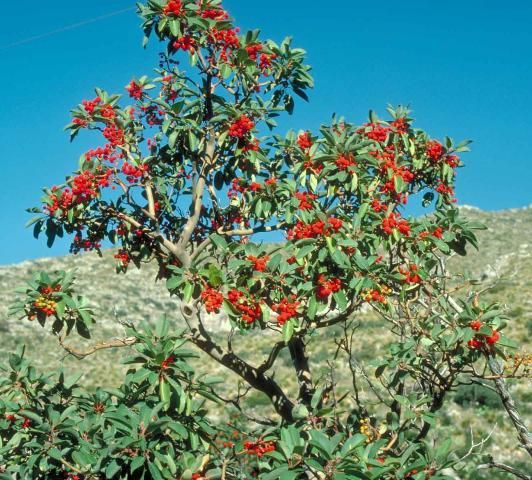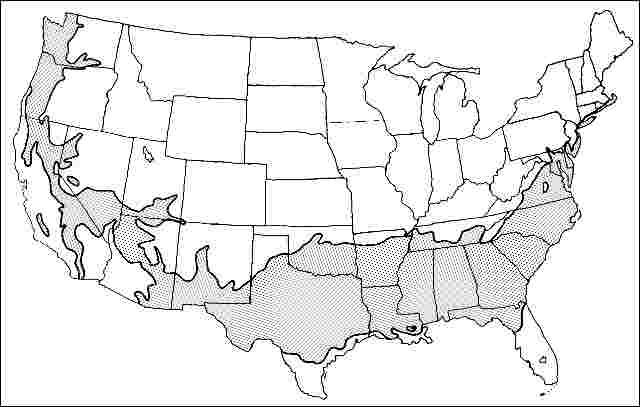Introduction
This native North American evergreen tree has beautiful peeling bark and reaches a height of 40 feet, but many trees are much smaller than this. As the tree ages, the outer bark drops off to reveal the smooth, new bark that can range in color from white, apricot, tan, or dark red, and the mixture of colors between old and new bark is quite striking. The dark green leaves, with paler undersides, are joined in springtime with small, white flowers, which have an interesting shape, almost like small lanterns. These blooms are followed by the production of orange or red berries that ripen in fall. Berries are very brightly colored and will attract attention in any landscape.

Credit: Ed Gilman
General Information
Scientific name: Arbutus texana
Pronunciation: ar-BEW-tus teck-SAY-nuh
Common name(s): Texas madrone
Family: Ericaceae
USDA hardiness zones: 7A through 8B (Fig. 2)
Origin: native to North America
Invasive potential: little invasive potential
Uses: tree lawn 3–4 feet wide; tree lawn 4–6 feet wide; tree lawn > 6 ft. wide; deck or patio; street without sidewalk; shade; specimen; parking lot island < 100 sq. ft.; parking lot island 100–200 sq. ft.; parking lot island > 200 sq. ft.; highway median; container or planter
Availability: not native to North America

Description
Height: 25 to 40 feet
Spread: 15 to 25 feet
Crown uniformity: irregular
Crown shape: vase, upright/erect
Crown density: moderate
Growth rate: moderate
Texture: medium
Foliage
Leaf arrangement: alternate
Leaf type: simple
Leaf margin: entire, crenate
Leaf shape: ovate, oblong
Leaf venation: pinnate
Leaf type and persistence: evergreen, broadleaf evergreen
Leaf blade length: 2 to 4 inches
Leaf color: green
Fall color: no color change
Fall characteristic: not showy
Flower
Flower color: white/cream/gray
Flower characteristics: showy
Fruit
Fruit shape: round, oval
Fruit length: .5 to 1 inch
Fruit covering: fleshy
Fruit color: orange, red
Fruit characteristics: does not attract wildlife; showy; fruit/leaves not a litter problem
Trunk and Branches
Trunk/bark/branches: branches don't droop; showy; typically multi-trunked; thorns
Pruning requirement: little required
Breakage: resistant
Current year twig color: gray, green
Current year twig thickness: medium
Wood specific gravity: unknown
Culture
Light requirement: full sun
Soil tolerances: sand; loam; alkaline; well-drained
Drought tolerance: high
Aerosol salt tolerance: unknown
Other
Roots: not a problem
Winter interest: yes
Outstanding tree: yes
Ozone sensitivity: unknown
Verticillium wilt susceptibility: unknown
Pest resistance: resistant to pests/diseases
Use and Management
Multiple trunks arise from the ground much like those of crape myrtle. Lower foliage and branches are often removed to show off this feature. Plant this tree to display the trunks near a patio, deck, walk, or other area where people come close to the tree. A row of Texas madrone planted on 15- to 20-foot centers can enlighten the entry way to an office park, condominium complex, or add character to a residential street.
Texas madrone grows in full sun on any well-drained soil, acid, or alkaline. It appears to be a very adaptable tree and should do well in a variety of landscape sites.
Propagation is by seed or micropropagation. Improved selections can probably be developed through micropropagation techniques.
Pests and Diseases
No pests or diseases are of major concern.